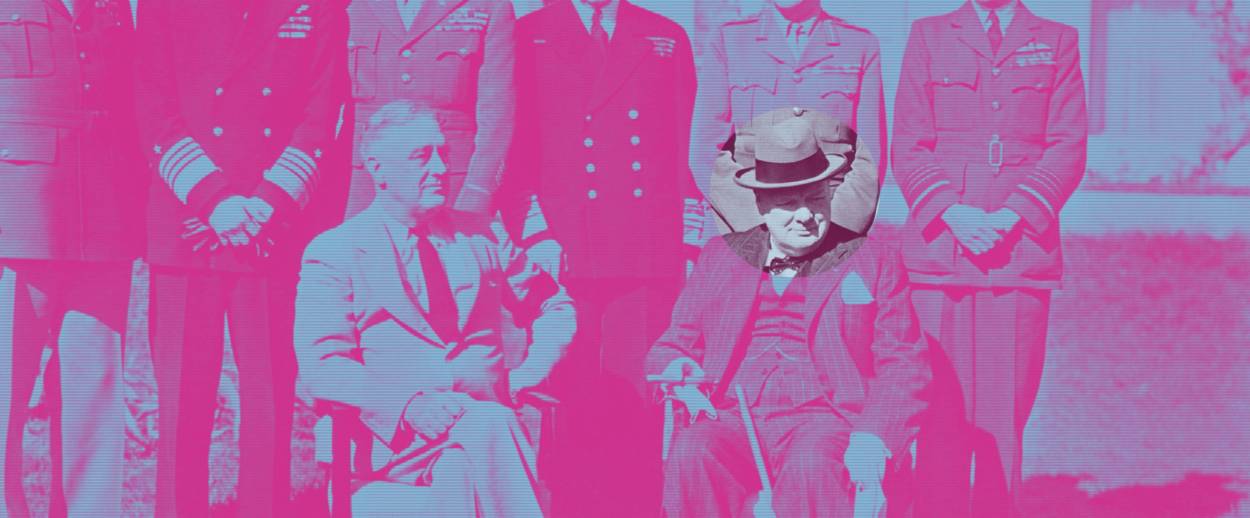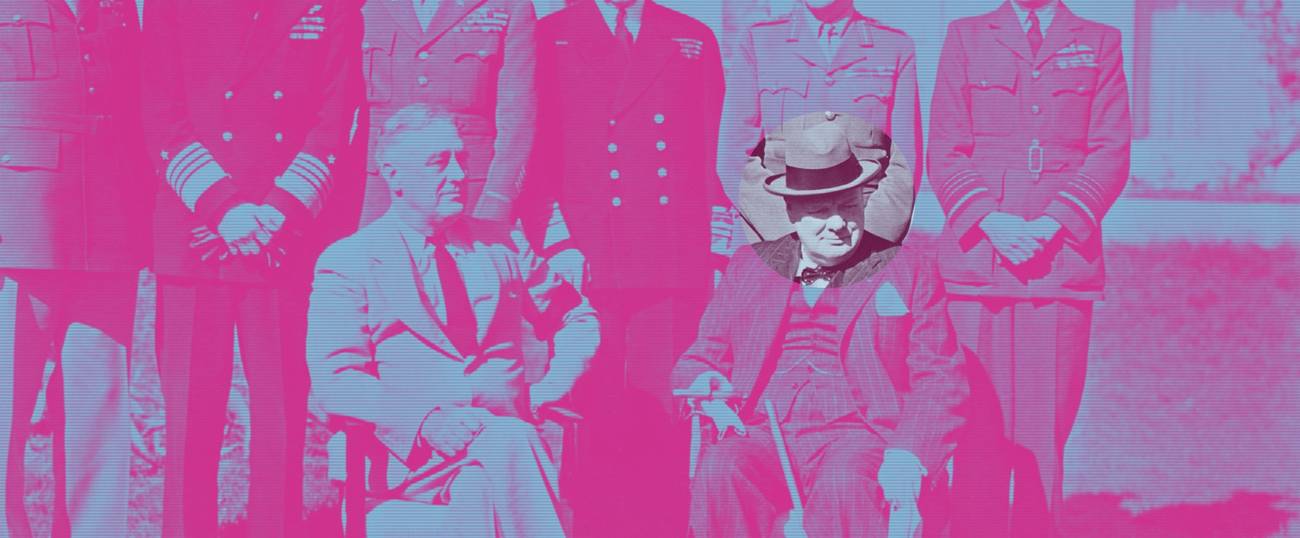Why Netanyahu Is No Churchill
The Israeli leader’s diplomatic efforts to stop a nuclear deal with Iran have proven a dismal failure




In a speech last week about Iran’s nuclear agreement with the West, which is supposed to monitor his country’s nuclear facilities over the next 25 years, Iran’s spiritual leader Ayatollah Ali Khamenei said: “I say [to Israel] that you will not live to see the end of these 25 years. With the help of Allah, there will no longer be anything called the Zionist regime in another 25 years. Until that happens, the struggle and the jihad will not give the Zionists a single moment of serenity.”
In saying this, Khameinei is reassuring his people: The nuclear agreement with the West does not obligate Iran to stop supporting terror. And now, he is insinuating, that support will actually increase with the lifting of the economic sanctions on his country as part of the deal. Israelis hearing that speech could not help feeling a slight shiver up and down their spines or asking themselves whether a parallel universe exists in which Iran signs a different agreement—one that limits its support of terror, an agreement in which Israel had some input in formulating its clauses. One thing is clear: If there is such a parallel universe in which Israel’s future is slightly more secure, Benyamin Netanyahu is not its prime minister.
Over the last few months, Netanyahu and his supporters in Israel and America have never stopped comparing the agreement that was signed in Vienna to the infamous Munich Agreement of 1938. The analogy is clear: Iran, which signed the agreement knowing full well that it is planning to violate it, is Nazi Germany. Barack Obama is the weak compromiser, Neville Chamberlain, whose compulsion to appease drove him to sign the humiliating agreement that permitted Nazi Germany to keep expanding its power.
But hold on a minute. There’s one thing missing in that very effective analogy: If Khameinei is Hitler and Obama is Chamberlain, then who is Winston Churchill? Why none other than Sir Benjamin Netanyahu, of course.
Let’s put the irony aside for a moment. The historic agreement with Iran is the last thing any sensible person would want to joke about because of the great dangers it poses. History will determine whether it strengthens liberal forces in Iran or is merely the first step in irreversible world deterioration. But while we have to wait in suspense for a decade to examine its results, we can already evaluate the results of Netanyahu’s behavior throughout the long crisis that culminated in the Vienna signing.
Anyone observing Netanyahu’s conduct will find it hard to see even a tiny spark of Churchill’s wisdom but will easily recognize it as a chronicle of ongoing failure. Three years ago, on the podium at the United Nations, Netanyahu warned against an agreement with Iran and called for an attack against it, holding an illustration of a bomb taken from a Bugs Bunny cartoon, and explained to the world at large: There can be no good agreement with Iran, and any agreement that leaves the ayatollahs with nuclear capabilities is an existential threat to Israel and the entire free world, and if the world doesn’t understand that, Israel will take responsibility for its fate and attack Iran itself. In the past, when the leadership in Damascus tried to build a nuclear reactor, then-Prime Minister Ehud Olmert made a tough decision and sent Israeli bombers to destroy it. Many years before him, it was Menachem Begin who ordered the bombing of the reactor in Iraq. Netanyahu was facing a more difficult situation because Iran’s nuclear reactor was further away, limiting the possibility of an air attack. So, what do you do if you want to bomb but you’re not really sure you can? You make threats from the podium of the United Nations and then do nothing. Because when it comes to talking, we all know, Netanyahu is always the very best.
From whatever angle you choose to look at Netanyahu’s handling of Iran’s nuclear development, you have to admit that the Israeli Churchill has failed. And now Iran has signed that troubling agreement with Israel’s allies, making an Israeli attack on its reactors impossible not only operationally but also diplomatically. Since that failure has taken place on Netanyahu’s watch, Israel’s prime minister must take responsibility and admit that something about his obtuse, provocative behavior in the international arena these last few years just hasn’t worked.
And what, many will certainly ask, could Netanyahu have done differently? It’s clear to everyone that he could have tried to exert influence in only two spheres: the military, where he chose not to act; and the political, where he did act, and in my opinion, with disastrous results.
Every rookie politician knows that, when negotiating such a crucial issue, you have to give something in order to get something in return. In his dealings with American and European leaders, Netanyahu did not behave like a clever statesman but more like a child who throws himself onto the floor in the mall, crying and shouting that he wants candy. And as any parent will tell his screaming child, that’s not the way to get candy, and that’s not the way to strengthen ties or gain leverage with your allies.
If John Kerry really is, as Israel’s Defense Minister and Netanyahu’s right-hand man Moshe Yaalon has said, an obsessive, messianic diplomat who cares only about winning a Nobel Prize, couldn’t Netanyahu have made a move or two to bring Kerry and Obama closer to their desired goal? Any progress in the Israeli-Palestinian conflict, for example, would have given the pair the feeling that Kerry could win his Nobel for his work in another area, one less dangerous to Israel. (When I interviewed Netanyahu four years ago, he said more than once that, unlike Iran, the Palestinians did not constitute an existential threat to Israel.) If the only thing those two babes in the wood wanted was to wave the flag of peace and brotherhood, maybe Netanyahu and his defense minister should not have invited charges of racism by claiming that the Arabs were flocking to the election polls en masse or that we have to separate the Palestinians and Israelis on buses in the occupied territories. Instead, they could have offered, for instance, to meet with Abbas and maybe even sign a small, temporary agreement with him, if only to convince the United States and Europe that this was a government ready to take a chance on negotiating with the Palestinian people in an attempt to find a genuine solution to their conflict. Netanyahu should have done so not out of his sense of moral obligation or even a strategic belief that such negotiations would succeed, but as a purely tactical move designed only as a slap in the face to the Chamberlains.
But it is beneath someone like Netanyahu to offer something in order to receive something else in return. Why ask the United States for anything if you can demand it? So, if the president requests that Netanyahu not speak in the Senate, he does it anyway, and if his racist statements drive away Israel’s allies, he makes them anyway. Then he throws himself onto the floor and screams so loudly that Obama will have to give in. Sadly, the American Chamberlain would rather give in to problematic leaders who negotiate with him, proving to be a bit less flexible with a self-righteous leader who occasionally forgets that he stands at the helm of a small nation that is a friend of the United States and not behind the desk of the Senate’s majority leader.
At the beginning of the crisis, Netanyahu said that the West must not sign an agreement with Iran under any circumstances. Later he said that an agreement could be signed, but a different one, and though he now and then threatened to bomb reactors in Iran, he did nothing. Today Israel is faced with an agreement that, almost by choice, it was not involved in crafting and knows nothing about, an agreement that makes no mention of Israel’s immediate interests related to the arming of Hezbollah and other terrorist organizations. Even if Iran doesn’t launch a nuclear attack against Israel in the next 25 years, the agreement signed in Vienna may strengthen Hezbollah and put us in even greater danger.
Future historians examining this moment in time will say either that Netanyahu exaggerated for years about Iran’s existential threat to Israel or if he didn’t, that he failed miserably to deal with that danger. In both cases, he will not emerge as a venerable military leader with a glorious past like Winston Churchill. He’ll instead be seen as just a prime minister who talked a good game but who, when put to the test, was a dismal failure.
Translated by Sondra Silverston
***
Like this article? Sign up for our Daily Digest to get Tablet Magazine’s new content in your inbox each morning.
Etgar Keret is a Tel Aviv-based filmmaker and fiction writer.